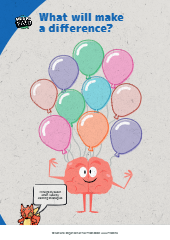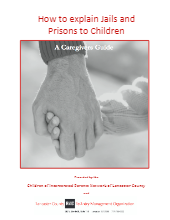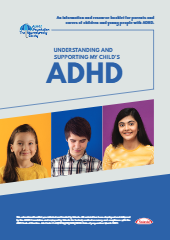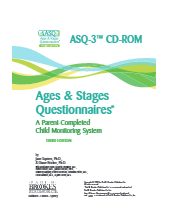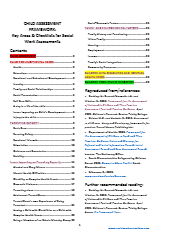My Brain, Me, and FASD Interactive Workbook
This interactive workbook is designed for children with Fetal Alcohol Spectrum Disorder (FASD), helping them understand how their brains work and how FASD affects their daily lives. Through engaging activities and illustrations, the workbook encourages children to explore their feelings, strengths, and challenges. It provides practical tips for managing emotions, improving focus, and building self-confidence. This resource is ideal for families, teachers, and carers supporting children with FASD, fostering understanding and promoting a positive sense of identity.

A reading of the book My Brain, Me and FASD
My Brain, Me, and FASD (Accessible Version)
This accessible workbook, created by the National Organisation for FASD, helps children understand how Fetal Alcohol Spectrum Disorder (FASD) affects their brain and daily life. Through engaging activities, it explores challenges like sensory issues and memory, while also celebrating personal strengths and achievements. Children are guided to develop coping strategies, create calm spaces, and build confidence in their unique abilities. This resource is ideal for use with trusted adults, such as parents, carers, or teachers, fostering hope and well-being for children with FASD.

About FASD (Easy Read) Guide
This easy-read guide explains Fetal Alcohol Spectrum Disorder (FASD) in simple terms, highlighting how it affects the brain and body. It emphasises that FASD is not a disease or anyone’s fault and that with the right support, people with FASD can thrive. The guide identifies common challenges, such as understanding instructions or coping in noisy environments, while celebrating positive traits like creativity, determination, and loyalty. It also offers strategies for making life easier for individuals with FASD, promoting awareness and support.
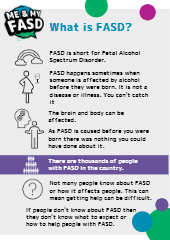
FASD: What Some People Think vs The Facts (Easy Read)
This guide debunks common myths about Fetal Alcohol Spectrum Disorder (FASD) and provides clear, fact-based insights. It highlights that FASD behaviours stem from brain differences, not naughtiness, and explains why traditional punishments or strategies may not work. The guide emphasises that people with FASD can achieve great things with the right support and understanding. It also addresses misconceptions about parenting, learning abilities, and physical traits, promoting informed and compassionate perspectives on FASD.
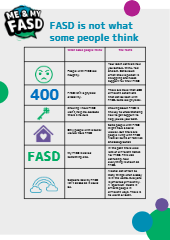
Brains Are Different: Understanding FASD for Young Readers
This book by NOFASD Australia introduces young readers to Fetal Alcohol Spectrum Disorder (FASD) in a simple and approachable way. Through engaging illustrations, it explains how everyone’s brain is unique and how alcohol, drugs, or certain medicines during pregnancy can affect brain development. The book highlights challenges like reading, managing emotions, and understanding others while emphasising the support available from professionals like psychologists, speech therapists, and occupational therapists. Aimed at promoting inclusion and reducing stigma, this resource is perfect for parents, carers, and educators introducing children to the concept of neurodiversity.
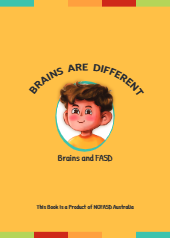
Living FASD Series 1-5: Supporting People with FASD
This magazine is part of the Living FASD Series, designed to celebrate the strengths of individuals with Fetal Alcohol Spectrum Disorder (FASD) while offering practical tips and resources. It includes creative activities like music, art, and mindfulness exercises that help manage stress and foster self-expression. Personal stories highlight achievements in areas like sports, dance, and crafts, demonstrating the unique talents of people with FASD. The magazine also encourages community engagement and offers tools like sunflower lanyards to promote understanding of hidden disabilities. A valuable resource for building awareness and supporting people with FASD in everyday life.
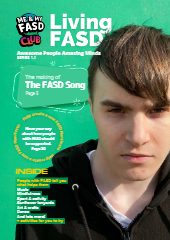
All About Me: Understanding Brain Differences
This resource is designed to help children with brain differences, including those with FASD, communicate their strengths, challenges, and needs to caregivers, educators, and supporters. It includes sections on emotional responses, sensory experiences, memory challenges, and effective strategies for support. The guide also offers practical tips for creating supportive environments and understanding behaviours as expressions of brain differences rather than intentional actions. This personalised booklet promotes understanding, inclusion, and collaboration for children with unique learning and developmental needs.
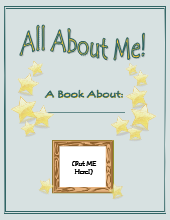
Brains Are Different: Understanding FASD for Young Readers
This book by NOFASD Australia introduces young readers to Fetal Alcohol Spectrum Disorder (FASD) in a simple and approachable way. Through engaging illustrations, it explains how everyone’s brain is unique and how alcohol, drugs, or certain medicines during pregnancy can affect brain development. The book highlights challenges like reading, managing emotions, and understanding others while emphasising the support available from professionals like psychologists, speech therapists, and occupational therapists. Aimed at promoting inclusion and reducing stigma, this resource is perfect for parents, carers, and educators introducing children to the concept of neurodiversity.

FASD Emotion Thermometer
This resource helps children with Fetal Alcohol Spectrum Disorder (FASD) understand and regulate their emotions. The “Emotion Thermometer” illustrates different emotional states, from calm to “blast off,” encouraging children to identify how they feel at each level. It provides space for kids to draw or write strategies that help them chill, either independently or with support from an adult. This tool is designed to teach emotional awareness and coping skills, reducing meltdowns and promoting a sense of control.

What’s Happening? Emotional Awareness Activity
This activity, part of the Me and My FASD toolkit, helps children with Fetal Alcohol Spectrum Disorder (FASD) explore their emotions. Using a body outline, children identify how they feel physically and emotionally when they are happy or upset. They are encouraged to draw or write about internal sensations (e.g., in their head, hands, or tummy) and external factors influencing their feelings. This tool fosters emotional awareness and is a stepping stone for learning coping strategies to manage challenging emotions.

Emojis: Understanding and Expressing Feelings
This activity, part of the Me and My FASD toolkit, helps children with Fetal Alcohol Spectrum Disorder (FASD) recognise and express their emotions using emojis. Children can circle emojis that represent how they feel, draw their own emojis, and write about what makes them feel good or bad. The activity also encourages kids to identify strategies that help shift emotions from anger to happiness. This resource supports emotional awareness and provides a fun, visual way for children to explore their feelings.

Emotions Tracker
This activity, part of the Me and My FASD toolkit, helps children with Fetal Alcohol Spectrum Disorder (FASD) monitor their emotions over a week or month. By tracking feelings on a daily basis using colours or emojis, children can identify patterns in their emotions, note what was happening during specific moods, and explore strategies that helped them. This tool, used alongside the Emotion Thermometer, supports emotional regulation and self-awareness, providing a visual way to understand and manage feelings.

Tree of Trusted People
This activity, part of the Me and My FASD toolkit, helps children identify trusted individuals who can provide support in their lives. The “Tree of Trusted People” allows children to write names of family members, teachers, doctors, social workers, or club leaders who they feel safe turning to for help. By visually mapping their support network, this tool encourages children to recognise the people they can rely on, fostering a sense of safety and connection.
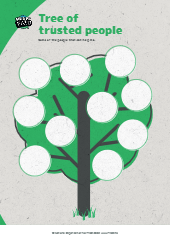
One Step at a Time
This activity helps children with Fetal Alcohol Spectrum Disorder (FASD) break down goals into manageable steps. Children can identify their current position, set a goal, and create a simple three-step plan to achieve it. The process encourages planning and focus, supporting personal growth and success in tackling challenges. This resource is ideal for fostering confidence and a sense of accomplishment.
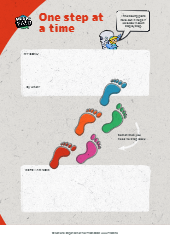
What Makes Me ME?
This activity celebrates individuality by encouraging children with FASD to explore their unique qualities. They can draw themselves or add a photo and fill in a diagram with traits, talents, and interests that make them special. By focusing on strengths and positive attributes, this tool boosts self-esteem and highlights the value of diversity.

Where Are You Today?
This reflective activity helps children with FASD understand and express their emotions. Using a hill illustration, they mark an “X” to indicate how they feel—whether on top of the world or struggling at the bottom. This simple exercise encourages emotional awareness and opens discussions about feelings and well-being.
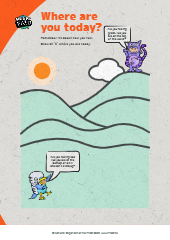
FASD Passport and Manifesto
The FASD Passport helps young people with Fetal Alcohol Spectrum Disorder (FASD) communicate their strengths and needs to trusted adults. It includes space for personal details, strategies that help, and key messages about FASD, emphasising understanding and support. Accompanied by the FASD Manifesto, it advocates for patience, respect, and education about FASD, empowering individuals to reach their potential.

Daily Plan
This simple daily planning tool helps children and caregivers structure mornings, afternoons, and evenings while incorporating calming strategies. By visualising daily routines, it encourages consistency, reduces anxiety, and supports emotional regulation for children with FASD.
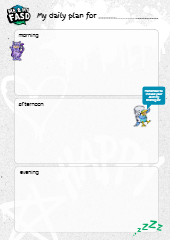
Traffic Light Cards
These colour-coded cards—green, amber, and red—enable children with FASD to communicate how they are feeling in a clear, non-verbal way. They help caregivers and teachers recognise when a child is ready to engage, needs support, or requires time to regulate, fostering better emotional awareness and support.

FASD Iceberg
This activity helps children with Fetal Alcohol Spectrum Disorder (FASD) explore how their experiences differ from what others see. Using an iceberg illustration, they can write about visible behaviours and hidden challenges, promoting better understanding and communication with caregivers and educators. This tool is ideal for fostering empathy and awareness about living with FASD.

What Will Make a Difference
This resource encourages children with FASD to identify strategies that help them cope during difficult times. It includes examples like using a blanket, spending time in a quiet space, or engaging with calming activities. By personalising their own list of effective techniques, children can build resilience and emotional regulation.
